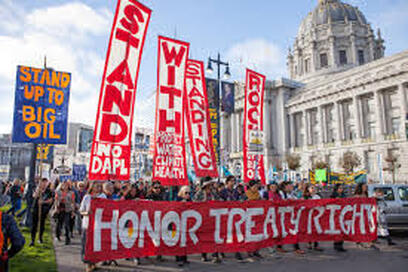Jack GreenSenior, Louisiana State University  “We’ve lived off this land, it's all we’ve ever done… and then now, they’re trying to build a pipeline outside my door? I don’t want this pipeline. My son is buried on top of that hill. Who wants a pipeline next to their son’s grave?” LaDonna Brave Bull Allard, Founder of the Sacred Stone Camp and Member of the Standing Rock Sioux Tribe said during an interview with The Guardian in 2016 . She continued, “You talk about racial discrimination, sexual discrimination; you talk about political power, corporations owning America. I’m seeing it all. Its all happening right here.” In 2017, after months of protests by environmental activists and the Sioux Tribal nation, construction on the Dakota Access Pipeline was completed. In their first month in office, the Trump administration issued full permits for the development of the project that had been delayed by the Obama administration to get more complete information on the environmental impact to tribal lands. The pipeline was opposed by over 100 federally recognized tribes and was considered a turning point in tribal response to U.S. federal projects. The combined efforts of litigation and on-the-ground protests cost the project’s investors around $750 million and lawsuits continue to this day. In it’s first six months of operation, the pipeline spilled five times, underlining the fact that even the most heavily monitored and assessed of pipeline projects are imperfect. The pipeline is widely considered by tribes as a violation of sovereignty and by environmental activists as a continuing threat to the drinking water of the region. The structure of U.S. tribal consultation policy was not strong enough to give the Sioux Nation substantial influence on permitting for a project that would affect their land. The pipeline decision has been a focusing event for many Democratic candidates running for president and other progressive policy makers in the U.S. who are calling for the integration of a land rights policy that is internationally considered a “best practice.” Those policies have not yet been introduced to the U.S. in order to empower Tribal Nations with greater environmental self-determination.  Free, prior, and informed consent (FPIC) is a standard of indigenous land rights policy that requires just what it implies, informed consent by indigenous peoples for development projects or government policies that could impact their territories or peoples. FPIC is considered a global “best practice” that most countries, including the U.S., have not yet implemented. FPIC is the difference between simply a requirement to consult with indigenous peoples over outside actions that can affect them and giving those communities a final say on whether those actions can be taken out at all, essentially giving the communities a “veto” power in the strictest interpretation. Current international law requires the standard of consultation, and in 2007 the United Nations passed the legally non-binding UN Declaration on the Rights of Indigenous Peoples (UNDRIP), recognizing the need for FPIC as a standard. Since then, Bolivia, Ecuador and Peru have all legally codified consent requirements when consulting with indigenous peoples, and even some international non-governmental entities have created their own FPIC policies. As of 2011 for example, the International Finance Corporation of the World Bank requires FPIC from potentially affected indigenous peoples for grants and loans on projects that raise environmental and social sustainability issues. The international community has slowly begun to transition FPIC from a “best practice" in theory to a public policy reality. Though FPIC is only now making its way into proposals by candidates in the U.S., it has been discussed as a standard by international groups and indigenous representatives for decades. Scholars argue that the right to FPIC stems from the right to self-determination articulated in the International Convention on Civil and Political Rights (ICCPR). The UNDRIP mentioned earlier also relates FPIC to self-determination and sovereignty, suggesting FPIC in matters related to relocation of communities, legislative action or administrative measures, disposal of hazardous waste, and “any project affecting their land or territories.” In addition to its legally nonbinding nature, the drawback for UNDRIP has been that its vague language defining “consent” has allowed for varying interpretation of whether indigenous communities have an absolute veto on these issues. In analysis of the implementation of UNDRIP, the Northwestern Journal of International and Human Rights determined four conditions needed for FPIC to be effectively implemented:
Current U.S. policies regarding tribal consultation either does not call for or does not specifically require most of these best practice guidelines. The Clinton Administration passed Executive Order 13175 in 2000 requiring “consultation and coordination” with tribal governments on a broad array of issues ranging from legislative instruments to development projects that can directly affect tribal communities. Then in 2006, the National Congress of American Indians (NCAI) released their own “best practice” standards when consulting with tribal nations. These standards include:
Despite these standards, many tribal nations still hold negative views of the U.S.’s current consultation process. Many have a perspective that, despite a vast number of governmental and private entities overwhelming tribal nations with requests for consultation for a variety of issues ranging in importance, consultation is meaningless because tribes don’t ultimately have a final say. They still lack consent in these decisions, whether they are approached for consultation or not. The requirement of gaining tribal nation consent would create incentive for governments to adhere to those NCAI best practice standards more closely. It would force developers to engage in consultation earlier on in the planning process and consider tribal input more seriously. Consultation requirements in the U.S. would also reinforce tribal sovereignty and improve the attitudes of tribal communities on the effectiveness and meaningfulness of consultation with government entities, because they would have that final say. In terms of the future of FPIC policies in the U.S., a number of 2020 Democratic primary hopefuls have released their own proposals with various degrees of specificity. Senator Elizabeth Warren’s proposal is by far the most lengthy and detailed platform for indigenous issues. Warren calls for the revocation of Keystone XL and Dakota Access pipeline permits on the basis that they did not receive the consent of the indigenous communities that they affect. The proposal also states “respect for tribal sovereignty means that no project, development, or federal decision that will have a significant impact on a tribal community… should proceed without the free, prior, and informed consent of Tribal Nations concerned. Secretary Julian Castro’s proposal addresses a need to “modify and codify tribal consultation requirements,” ensuring tribes have judicial recourse if their input is not considered during consultation. He goes on to call for the end of “leasing of lands for fossil fuel exploration and extraction,” and requiring “free, prior, and informed consent” of tribal communities on infrastructure projects that affect them. Senator Bernie Sanders’ tribal policy platform has a bullet point calling for a Green New Deal to undo damage inflicted on indigenous peoples and to “stand with Native Americans in the struggle to protect their treaty and sovereign rights.” In addition to these campaign proposals, U.S. Representative Ocasio-Cortez’s 2019 H.Res.109 Green New Deal Resolution called for “obtaining the free, prior, and informed consent of indigenous peoples for all decisions that affect indigenous peoples and their traditional territories… and protecting and enforcing the sovereignty and land rights of indigenous peoples” as a standard to achieve the stated goals of the proposed Green New Deal mobilization. Much of the world’s biodiversity and lands threatened by climate change are kept by and belong to indigenous peoples. The issue of FPIC is not only a sovereignty issue, but in many ways, it is also an environmental justice issue. The policy challenge of climate migration and community displacement is becoming a growing subject of contention on all levels of government, and many indigenous communities and tribal lands are in areas threatened by sea level rise. For U.S. tribes specifically, the way state and federal governments handle this issue, either by adaptation or relocation, could have massive repercussions on the future of their community. The University of Colorado Law Review States “[their] right to environmental self determination is necessary for survival." “We’re about protecting our water. We’re about protecting our sacred places. We’re about protecting our sovereignty,” said Dabe Archambault II, Chairman of the Standing Rock Sioux Tribe during interview with ABC news in 2016 on the Dakota Access Pipeline. The issues the Sioux Tribe have faced with the Dakota Access Pipeline permitting are not new to U.S. tribes and will only be echoed by future environmental development tensions as climate change and sea level rise exacerbate flash points of conflict. Only time will tell if the proposals set forth by these Democratic primary challengers will ever translate into real policy, but it shows that the permitting and development has started a new conversation in tribal sovereignty and land use in the U.S. as it relates to environmental self-determination.
2 Comments
Amber N Gholson
15/11/2019 11:51:26 am
I find it hard to even believe that there are people who agree with building the pipeline without informed consent of indigenous peoples since we are building on their land. It is amazing that their concern was disregarded, especially since it has leaked twice, with the most recent on spilling 383,000 gallons of crude oil.
Reply
Michael Beechey
9/12/2019 06:04:37 pm
While I agree with the sentiment of the article, in that everyone who owns land ought to have a say in the kind of construction which takes place on it, the premise of the article is flawed in that while the DAP does come within a mile of the Standing Rock Reservation, it never crosses territory recognized by the United States Government as belonging to the tribe. This isn't to say they haven't been slighted before, the dams on the Missouri have flooded acerage which belonged to them, but in this specific instance it isn't their land. If there were to be changes to policy involving potentially hazardous materials being transported nearby indigenous peoples, it would have to drastically have to increase the rights of landowners in close proximity to these constructions across the board to apply in this particular case.
Reply
Leave a Reply. |
ArchivesCategories |
 RSS Feed
RSS Feed
